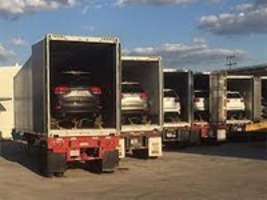Are you in the construction industry and need to transport heavy equipment? Whether moving machinery to a new job site or shipping it across state lines, proper planning and choosing the right transport company is crucial for a smooth process. In this complete guide to construction equipment transport, we’ll share ten essential tips to help you quickly navigate this often challenging task. From understanding the logistics involved to ensuring the safe delivery of your valuable equipment, we’ve got you covered! So, let’s dive in and make your next transportation experience a breeze! Construction Equipment Transport
Planning for Transport: What You Need to Know
Transporting construction equipment is no small feat. It requires careful planning and preparation to ensure a smooth and successful operation. Here are some essential tips to consider when it comes to planning for transport:
1. Assess your equipment: Before you even begin the transportation process, take the time to assess your equipment. Consider its size, weight, and any special requirements it may have.
2. Determine the route: Planning out the most efficient route is crucial in ensuring the timely delivery of your construction equipment. Consider any road restrictions or narrow passages that may pose challenges during transit.
3. Obtain necessary permits: Depending on the size and weight of your equipment, you may need special permits for transportation purposes. Research local regulations and obtain all required permits well in advance.
4. Choose appropriate trailers: Selecting suitable trailers for transporting your construction equipment can make all the difference in its safety and security during transit.
5. Securely fasten equipment: Properly securing your machinery is vital to prevent damage or accidents. Use chains, straps, or other securement devices as needed.
6. Communicate with drivers: Maintain open lines of communication with drivers throughout the transportation process so they can provide updates on progress or address any concerns that arise.
7. Ensure insurance coverage: Accidents happen, so proper insurance coverage is essential when transporting valuable construction equipment. Before proceeding, confirm that you and the transport company have adequate insurance policies.
Remember, thorough planning will save time, money, and headaches downwind. By considering these important factors, you can help ensure a smooth and successful journey from start to finish.
Choosing the Right Transport Company
Choosing the right transport company is crucial when transporting your valuable construction equipment. Here are a few essential tips to help you make the best decision:
1. Research and Compare: Take the time to research different transport companies in your area and compare their services, pricing, and customer reviews. Look for companies with experience in handling construction equipment.
2. Check Insurance Coverage: Ensure the transport company has adequate insurance coverage for potential damages or accidents during transit. Knowing that you’re protected financially will give you peace of mind.
3. Licensing and Permits: Verify if the transport company holds all necessary licenses and permits required by law to operate legally. This ensures compliance with transportation regulations.
4. Fleet Size and Condition: Consider the size and condition of the transport company’s fleet before deciding. A more extensive fleet indicates better availability, while well-maintained vehicles reduce the risk of breakdowns during transportation.
5. Specialized Equipment: If you have specialized construction machinery or oversized equipment, ensure the transport company has experience handling such items safely and securely.
6. Expertise in Route Planning: Construction sites, including remote areas or congested urban environments, can be located anywhere. A reputable transport company should have expertise in route planning to navigate these challenges effectively.
7. Communication Channels: Effective communication is vital throughout transportation logistics. Choose a company that provides clear communication channels so that you can stay informed about the progress of your equipment at all times.
8. Tracking Capabilities: Opting for a transport company with advanced tracking capabilities allows you to monitor your equipment’s location in real time throughout its journey from pick-up to delivery.
9. Customer Service Excellence: Look for a reliable transport provider known for excellent customer service support available round-the-clock if any issues arise during transit or after delivery.
Construction Equipment Transport Pros:
• Cost-effective option: Renting equipment transport can be a more affordable option compared to purchasing and maintaining your own fleet of vehicles.
• Convenience: With construction equipment transport, you no longer have to worry about the logistics and transportation of your machinery. This frees up time and resources for other aspects of your project.
• Saves space: Owning a large fleet of vehicles can take up valuable space on your construction site. By renting equipment transport, you can eliminate the need for storage space and use it for other purposes.
• Professional handling: Equipment transport companies have trained professionals who know how to handle and transport heavy machinery safely. This reduces the risk of damage or accidents during transit.
• Flexibility: Renting equipment transport allows you to choose from a variety of vehicles depending on your specific needs and project requirements. You can easily switch between vehicles as needed without the commitment or cost of owning them.
Construction Equipment Transport Cons:
• Limited availability: Depending on the location and demand, equipment transport services may not always be readily available, requiring advanced scheduling and potentially causing delays in your project timeline.

